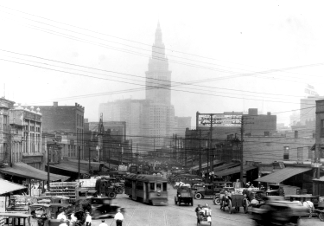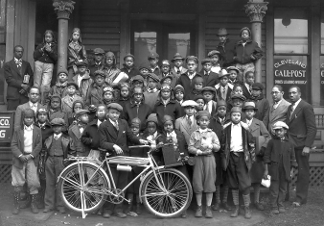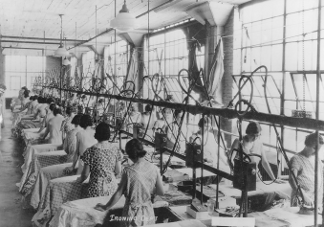HUGHES, (JAMES) LANGSTON (1 Feb. 1902-22 May 1967), black poet, playwright, novelist, and lecturer, was born in Joplin, Mo. to James Nathaniel and Carrie M. (Langston) Hughes. He moved to Cleveland in 1916, and began writing seriously while a student at CENTRAL HIGH SCHOOL, where his efforts were encouraged by teachers and RUSSELL† and ROWENA JELLIFFE† of Playhouse Settlement (see KARAMU HOUSE). His first stories appeared in The Monthly literature journal published by Central High School. Hughes attended Columbia University for a year, but dropped out to travel, working his way through Spain, France, Italy, and Africa. Hughes's first poem, "The Negro Speaks of Rivers," was published in The Crisis, the organ of the NAACP, in 1921. In 1922 he moved to Harlem, becoming a member of the Harlem Renaissance. Following publication of The Weary Blues in 1926, Hughes wrote Fine Clothes to the Jew in 1927. Awarded a full scholarship for his poetry by Lincoln University in Pennsylvania, Hughes received his B.A. In 1930 he published his first novel, Not without Laughter, followed by Scottsboro Limited (1932) and The Ways of White Folks (1934). He received a Guggenheim Fellowship in 1935. In 1936-37, the Gilpin Players of Karamu House produced 6 of Hughes's plays. In 1939 he established the Negro Theater in Los Angeles and wrote a filmscript, "Way Down South." Hughes produced 8 volumes of poetry, 4 of fiction, 6 books for young people, 3 humorous works, 2 autobiographies, a number of plays and essays, and several volumes on black history. He was a noted lecturer and a foremost figure in the movement for black civil rights and the search for black identity. Unmarried, Hughes died in New York City.
Dickinson, Donald C. A Bio-Bibliography of Langston Hughes (1972).
Last Modified: 18 Jul 1997 04:03:25 PMRampersad, Arnold. The Life of Langston Hughes. (2 Volumes, 1986).
- Related Article(s)









